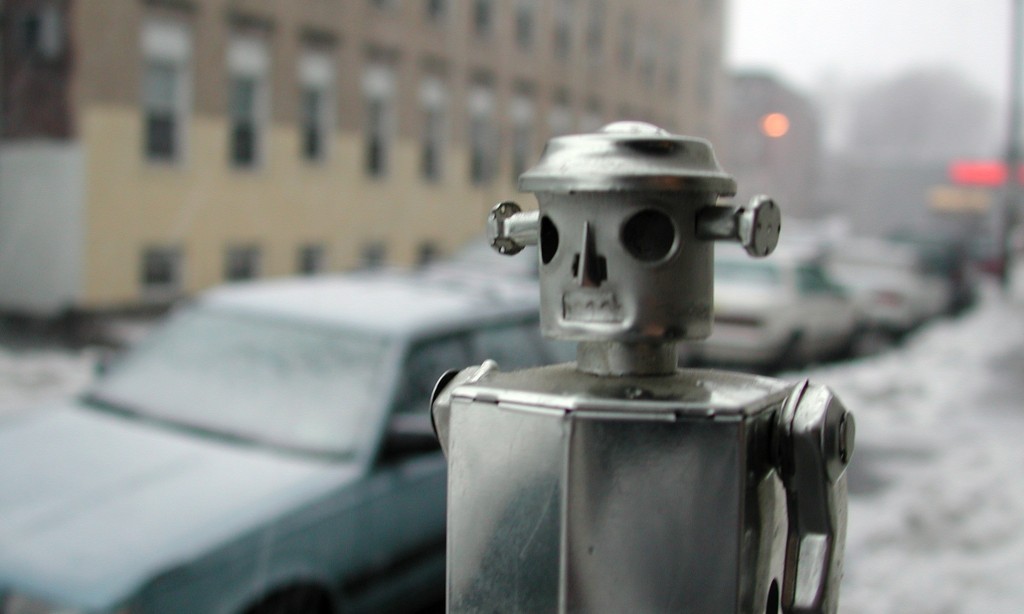While standing at the assembly line, full stomach made Michael sleepy after the lunch. He should have not drunk so much the evening before. Piece of stamped steel fell out of his hand and hit the ground with loud noise. He noticed the coming supervisor. Rising adrenalin woke him up immediately. The supervisor did not come to scald him this time. Instead, he pushed a metallic machine reminding human figurine right next to Michael. It was switched on and animated faux eyes started to monitor Michael. After an hour of scanning his movement, the machine was able to replicate all of Michael’s motions and he was fired.
This is not a sci-fi – a robot called Baxter truly exists. It takes him one hour to learn simple repetitive movements and then it is able to repeat them with objects which weight no more than 10 kilograms. Baxter costs 22 thousand US dollars. It is less than work costs of one employee with average salary in Slovakia for two years. Baxter does not smoke, drink and harass female colleagues. He is not in trade unions as well as he is not entitled to get a minimum wage. He will work with the same speed and quality even if heating and lightning in the factory is turned off. He does not get infected by any virus (if employer does not connect him to the internet). He does not have kids and he is not going to take a sick leave during the World Cup. So when is Baxter going to replace you?
This kind of stories revive the fears of robots taking our jobs – probably sooner than later. This fear is old as the technology itself. Employees were destroying machines in factories at the beginning of 19th century. After the fall of communist regime, while reading magazines I was wondering how anybody can be afraid of robot expansion which allows us not to do difficult, dangerous or simply boring work. After a quarter century I am reading almost identical articles again. Even though the productivity has been growing for past two centuries, the majority of people is still employed and there is still something to do. And the time of abundance, assumed by Keynes, when we are supposed to spend most of our time doing our hobbies, is still not visibly within our sight.
Being a layman, I still do think that construction of a machine which will know as much as an under average intelligent human knows is extremely difficult. A machine which has to process thousands and thousands of changing variables and to adapt its actions. I know this is a subjective view but I believe that machines are still surprisingly stupid at least when you compare it to the expectations 25 years ago and the threat of artificial intelligence. I missed a bus because of mistakes done by an automated cashier this week. Actually I was the one who was substituting a human cashier by scanning product codes myself, and not the machine. He was supposed just to read the codes, count the payment and give me a change. It failed to do that as well.
Who says that driverless car is almost ready? Well, airplanes have been flying (and falling) with autopilots for years and yet there is still enough to do. Even if the machines get much smarter, it does not mean that there will be no place for humans. Labor is infinite because human needs and desires are endless. Just try to imagine all these unrepaired houses, dirty parks, lonely pensioners, uncured diseases and hobbies you would like to do if you could. Just one hundred years ago most of the population was working in agriculture. Machines “stole” that work and expelled us out of it. Does anyone miss it? People do not want to work but they want a salary. We would like to get things without any effort. It is partially happening thanks to robots.
Theoretically, we can’t exclude an option where robots totally replace humans. Maybe once they will really do everything better and cheaper than we do now. Godspeed! I am just afraid I will live not long enough to experience that era when you will have nothing to do if the development keeps the current pace. If the development would have reached that stage, the society would become not only much richer but also totally different than it is today. Until it happens, I will worry about more urgent social problems – for example, why the schools still use hundreds years old ways of education which ignore the opportunities offered by internet and computers.



